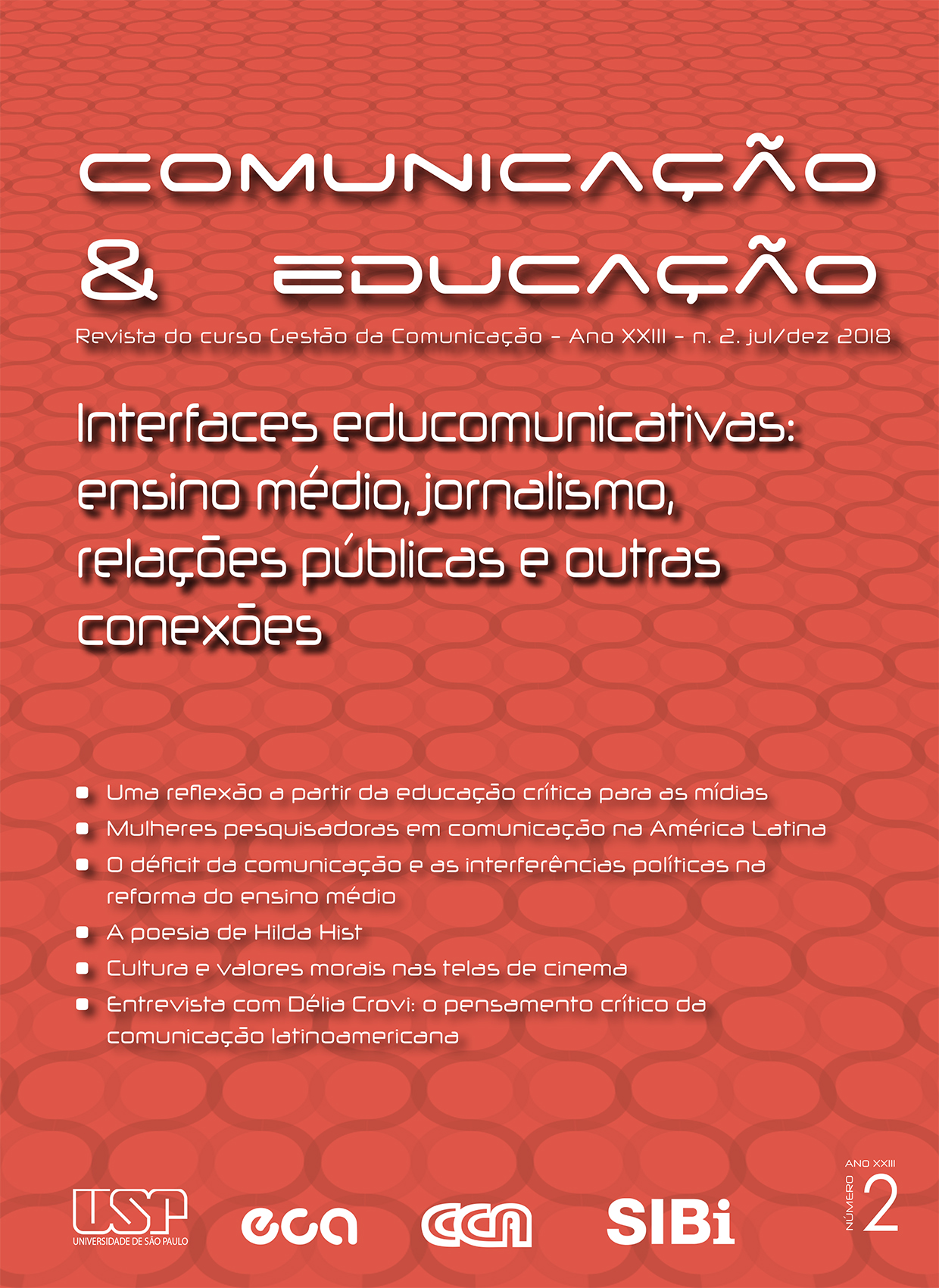Connected active learning amidst the chaos of the student-actor- network
DOI:
https://doi.org/10.11606/issn.2316-9125.v23i2p35-47Keywords:
connectivism, actor-network theory, social technology, active learning, interactionAbstract
This article brings a reflection on education in communication. Topdown models are being debated and have not been used since the internet. Teachers and students discover and update knowledge in real time, within and outside the classroom – in chats, on the streets, on WhatsApp – and share knowledge by creating links. Here are just two of the basic principles of this study: Connectivism, postulated by Siemens (2005): maintaining up-to-date and rigorous knowledge is the goal of all collectivist learning activities and learning can reside in non-human devices. His theory takes into account the tendencies of learning, the use of technology and networks. It also emphasizes the reduction of the half-life of knowledge. Thus, one of the proposals was to compare Siemens’ theory to the work of authors such as Downes, Brown, Santaella, Mattar, Perniola and Latour, among others, who inspire us to apply actions, transcriptions and interactions with students in our daily lives, in order to collaborate to this reflection.
Downloads
References
BANK, J. A morte das ciências humanas vai matar também as exatas. Disponível em: <http://pt.aleteia.org/2016/01/26/a-morte-das-ciencias-humanas-vai-matar-tambem-as-exatas-2/?ru=b4127ec0c12e59207195a9bc32e85f72>. Acesso em: 18 set. 2016.
BECKER, B. Vida na Mídia: além do jornalismo. Entrevista com Mark Deuze. Nº 19. vol. 1. 2016. Revista Eco Pós. Disponível em <https://revistas.ufrj.br/index.php/eco_pos/article/view/3354/2629>. Acesso: 12 nov. 2016.
BROWN, J.S., (2002). Growing up digital: Como as mudanças na web funcionam, educação e as formas de aprendizagem das pessoas. Associação de Ensino a Distância dos Estados Unidos. Disponível em: <http://www.usdla.org/html/journal/FEB02_Issue/article01.html>. Acesso em: 25 jan. 2016.
DOWNES, S. (2006). Redes de aprendizagem e conhecimentos conexos. Disponível em <http://it.coe.uga.edu/itforum/paper92/paper92.html>. Acesso: 14 nov. 2016.
JONASSEN, D. Computadores, ferramentas cognitivas: desenvolvendo o pensamento crítico nas escolas. Porto-Portugal: Porto Editora. Coleção Ciências da Educação Século XXI, nº 23, 2007.
LEMOS, A. L.M.; Rodrigues, L. P.B. – Internet das coisas, automatismo e fotografia. Revista Famecos. Porto Alegre, v. 21, n. 3, p. 1016-1040, setembro-dezembro 2014. Disponível em: . Acesso em: 16 abr. 2017.
MATTAR, J. Aprendizagem em ambientes virtuais. Revista Teccogs n. 7, jan.-jun., 2013. Disponível em: <http://www.pucsp.br/pos/tidd/teccogs/artigos/2013/edicao_7/2-aprendizagem_em_ambientes_virtuais-joao_mattar.pdf>. Acesso em: 17 out. 2016.
MORA, F. “É preciso acabar com o formato das aulas de 50 minutos”. Especialista em Neuroeducação aposta na mudança de metodologias, mas pede cautela na aplicação da neurociência na educação. El País/Madri 23 fev. 2017. Disponível em: <http://brasil.elpais.com/brasil/2017/02/17/economia/1487331225_284546.html>. Acesso em: 23 fev. 2017.
PERNIOLA, M. Do sentir. Editorial Presença, Lisboa. Tradução de Tom Guerreiro. 1999.
SANTAELLA, L. Comunicação ubíqua: repercussões na cultura e na educação. Paulus, São Paulo. 2013.
_______. Curso de especialização em educação na cultura digital. Linguagens do Nosso Tempo. 1ª Edição. Brasília, DF. MEC. 2014. Disponível em <http://catalogo.educacaonaculturadigital.mec.gov.br/hypermedia_files/live/linguagens_do_nosso_tempo/apresentacao.html>. Acesso em 12 dez. 2016.
ScienceWeek (2004) Matemática: Teoria da catástrofe, atractores estranhos, caos. Disponível em: <http://scienceweek.com/2003/sc031226-2.htm>. Acesso em: 14 dez. 2015.
SIEMENS, G. (2003). Learning ecology, communities, and networks: Extending the classroom. Disponível em <http://www.elearnspace.org/Articles/learning_communities.htm>. Acesso em: 16 jan. 2015.
_______. (2005). Connectivism: A learning theory for a digital age. International Journal of Instructional Technology and Distance Learning. Disponível em: <http://www.itdl.org/Journal/Jan_05/article01.htm>. Acesso em: 18 fev. 2015.
_______. (2006). Knowing knowledge. Disponível em: < http://www.elearnspace.org/KnowingKnowledge_LowRes.pdf>. Acesso em: 12 mar. 2015.
_______. (2008). A world without courses. Disponível em <http://www.elearnspace.org/media/worldwithoutcourses/player.html>. Acesso: 16 jan. 2015.
Downloads
Published
Issue
Section
License
I authorize the publication of the submitted article and soon the copyrights to the magazine, in the printed and electronic version, if it is approved after the evaluation of the reviewers.
I understand that readers may use this article without prior request, provided the source and authorship are mentioned. Readers are not authorized to use this article for reproduction, in whole or in part, for commercial purposes.

































